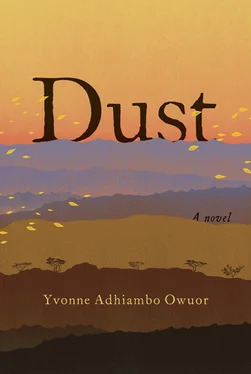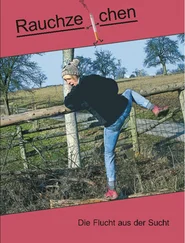Later.
“Arabel,” Isaiah murmurs, “where’s Bernardo now?”
She recoils. A tiny shard of that strangeness is still lodged somewhere inside her. But it is working its way out. She gives Isaiah a limpid look, and her hands seek his, and his fit around hers.
Doum palms creak.
She says, “Ghosts lurk.”
“We’ll watch them together,” he says.
“Wildlife?”
“Old friends.”
Ajany’s laugh is throaty.
Isaiah chuckles with her. He says, “Nothing left to run away from now. No shadows.”
Her fingers stroke Isaiah’s skin. “How did you find me?” she asks.
“Your mother.” Ajany bucks. Isaiah’s arms tighten around her. “She says I’m to enfold you. Like this.” He squeezes Ajany to himself.
Breath squashed, she gasps, “What?”
“Or she’d dethrone me.”
“Dethrone?”
“From the hand gesture she made, I believe it means ‘to castrate.’ ”
Tears flood Ajany’s eyes.
“I’ll kiss you now,” Isaiah tells her.
Ajany waits.
“Dethrone,” murmurs Isaiah.
Giggles color the darkness. It pours into so many emptinesses.
WAVE OF DEPARTURES. NYIPIR SLIPS ON HIS OLD FEDORA, adjusts a frayed military jacket over a pale-brown shirt. A large green rucksack lies on the floor, stuffed with basics: knife, a snub-nosed pistol, rope, water bottle, a tattered black Bible, lighters, packs of newspaper-wrapped dried meat, three different passports, four identity cards, two credit cards, Maasai blankets, a rolled-up reed map, green coffee beans. From the depths of an old suitcase, Nyipir plucks out and unwraps the mouth organ.
He lifts it to his mouth and picks out chords he has given names to: Petronilla, Ajany, Odidi, Theo, Agoro. Akai, Galgalu … He evokes a tune.
Petrus Keah approaches the room and stops to listen. Eyes shut, he leans against the wall. Then he straightens up and saunters in, newly shaven, shirt unbuttoned, chest exposed, a white-and-gray Somali kikoi wrapped around his waist, red socks and gleaming black shoes adorning his feet.
Nyipir sees Petrus. His music stops.
Petrus bays an old regimental marching song off-key:
Fungua safari / Sisi vijana … / Amri ya nani …
Start the march / We young soldiers … / Whose order are these …
Nyipir accompanies him, looking him up and down. A frown of distaste spreads across his face. The music stops again.
“Keah, red socks, sooaly ?”
Petrus turns his heels, indicates the ensemble, gestures with a finger.
“Everything ‘Made in Italy,’ osiepna .”
Nothing to add, Nyipir resumes their music.

“B-baba?” Ajany hears the music on her way to her father, and, like Petrus, halts to listen. Here it was. The soul of Odidi’s music. She tiptoes into the room. And falters. There. No lines, no contours, intensity of pale-orange light from the window shines upon dust fragments floating inside the space. Her father, Petrus, glimpses of backlit, blue-shadowed otherness, as if time had loosened its hold on the both of them. She gasps.
“Nyara.” Nyipir turns. He slips the mouth organ into the rucksack. “I’ve been waiting for you.”
Ajany sees the travel packs on the floor. “You’re leaving.”
“Mandalay, 21° 59′ N 96° 6′ E, Rangoon, 16° 47′ N 96° 9′ E.”
“B-burma.”
He nods.
Her eyes widen in Petrus’s direction. “With him ?”
Petrus purses his lips.
An awful stutter garbles Ajany’s words so tears show up in Nyipir’s eyes. She chokes out, “B-but when will you come back?”
When she was little, she would ask him this, and when she did, he promised to be home before the moon began to smile.
Nyipir reaches for both his daughter’s hands. “Today … today I don’t know.”
She stares. Huge tears floating in her eyes.
“I’ve something for you and Od … er …” Nyipir pulls out an old hard-covered black notebook held together by rubber bands. “Bank safety-deposit details. Odidi’s name. Yours also. Gemstones. Converted from money from … er … trading. Sign in with your ID when you go. It’s all been arranged.” Ajany’s hands hover over the notebooks. Soft-voiced, Nyipir leans close: “Or leave it. Begin something new. Something that’s yours.” A pause. “You decide.”
Silence stripped bare.
“Baba?”
“Yes.”
Stillness.
She says, “Akai-ma’s leaving.”
“Yes.”
“And Galgalu.”
“Yes.”
Ajany looks at tearstains spreading on their clothes.
What endures?
Silence.
Then Nyipir whispers. “Draw a picture for us,” he adds. “Yes, shade even death in … use the colors of the sun and … and …” He remembers. Grunts it out: “forgiveness.” Quiet. “Create room for trying again. Breathing.” They wait.
“Will you, nyara ?”
She did not understand, but his brows were puckered, eyes searching hers. In them the past, the here and the faith. She speaks to faith, she says Yes .
In Nyipir’s age-etched eyes, new tears. So Ajany burrows her face into his shoulders.
Ajany will hold the memory of light and clouds visible from a window. She will remember her head on Baba’s shoulders, hear echoes of music, smell pilgrimage, mystery, and all the worlds a father contains on musty travel clothes. She will savor this departure, the texture of old salt, and the weightless inability to say the word “Goodbye.” She remembers Nyipir repeating, “Ah, nyathina ,” a rumbling voice calling her his own, and when she glances at Petrus once more, he has become another sign of faith.
Before Nyipir crossed the threshold that separated Wuoth Ogik from the rest of the world, Ajany gave him her sketchbook. Inside were two watercolors: one an impression of his brother, Theophilus, and the other his father, Agoro, revealed in colors taken from shades of longing within Baba’s voice. He inserted Odidi’s folded photograph into the pages: all the Oganda men in one place.
What endures? Echoes of footsteps leading out of a cracking courtyard, and the sound a house makes when it is falling down.
What endures?
Starting again.

Galgalu pivots sharply and moves to his left down a fire-eaten trail, which had those many years ago brought him into Wuoth Ogik. He crosses the space which takes him past the place where the Trader’s tukul had been, where he had seen that death was also fire, and it warmed the face of life. He looked and saw that the wind still came to scatter the ash and dust.

Akai Lokorijom dispossesses herself even of stories she had buried in the earth. She tells these to Ali Dida Hada as they walk with slow steps. He receives them. When she stops speaking, he is still there. So they walk some more. As they walk, Ali Dida Hada tells Akai about beginnings. Tells her that if she wants he will tell her his original name, the one he had forgotten. She tilts her head so he can whisper it into her left ear. She hears it and laughs, and he with her. They walk and walk until, one day, near a gorge with secret, sweet water streams, they cross into a land where the fire makers lived, a short distance from a forge. Akai and Ali Dida Hada see pale-yellow moonflowers thriving on the shadow side of a conical green hill.
AJANY AND ISAIAH ARE THE LAST TO LEAVE WUOTH OGIK. THEY leave so the fire burning down the house can finish its work. The house glows. Resin-infused flames. Everything — wood, books, art, chairs, memories — turns to ash. At first the fire had mesmerized them. They watched it from their campsite, and Isaiah dragged out his battered camera to take pictures. But then, seduced by the fire’s frenzied freedom, they had danced before it giddy as children, and in their dancing there was fire and the spirit in the fire found bodies stripped bare to weave into replete landscapes, into which untiring desire roared in visceral rites of exorcism. The next night — just after midnight, when it was coolest — they set out for North Horr. They walked into the morning and past the evening. If they had left even three days after the others had, or if they had waited at Wuoth Ogik one more hour, they might have escaped the weight and waves of the flash flood. The mighty water was from a deluge that had ripped apart an ancient bridge, and caused the Ewaso Nyiro to rise and spread inland over a fifty-kilometer radius for the first time in remembered history.
Читать дальше












